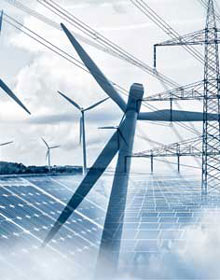
As South Africa braces for a significant increase in electricity prices this April, the urgency to explore alternative energy solutions has never been more critical. With a staggering 36.1% price hike looming on the horizon, investing in solar power emerges as a timely and strategic move for households and businesses alike.
The impending surge in electricity costs is a multifaceted issue, influenced by rising demand, supply chain disruptions, and global economic tensions affecting fuel prices. For South Africans, this translates into a hefty increase in monthly energy bills, posing a financial strain for many. The anticipated price hike is not only a reflection of global economic pressures but also highlights the vulnerabilities within the country's energy sector.
South Africa's reliance on coal-fired power plants, which account for the majority of the nation's electricity, underscores the need for diversification. These plants are not only environmentally harmful but are also susceptible to fluctuations in coal prices and supply chain issues. The shift towards renewable energy sources, such as solar power, is not just a matter of environmental responsibility but a necessity for economic resilience.
Solar power presents a compelling alternative in the face of rising electricity costs. By harnessing the sun's energy, solar panels can significantly reduce reliance on traditional power sources, leading to substantial savings over time. In a country blessed with abundant sunshine, solar power is not only viable but an underutilized resource.
The initial investment in solar technology, while significant, is quickly offset by the long-term savings on electricity bills. Homeowners and businesses can expect to see a return on investment within a few years, after which the savings are substantial. Furthermore, with the possibility of selling excess energy back to the grid, solar power can even become a source of income.
The South African government has recognized the importance of promoting renewable energy and offers various incentives to encourage adoption. These incentives include tax rebates and subsidies that make the transition to solar power more financially feasible. Additionally, businesses that invest in solar technology can benefit from accelerated depreciation on solar assets, further enhancing the financial appeal.

For residential users, financial institutions are increasingly offering green loans and financing options tailored for solar investments. These loans often come with favorable terms, recognizing the long-term value of investing in renewable energy. By leveraging these incentives, South Africans can significantly reduce the upfront costs associated with solar power installation.
Beyond the financial advantages, solar power offers numerous environmental benefits. As a clean and renewable energy source, it plays a crucial role in reducing carbon footprints and combating climate change. South Africa, with its rich biodiversity and ecosystems, stands to benefit immensely from a shift towards cleaner energy sources.
Embracing solar technology aligns with global sustainability goals and demonstrates a commitment to environmental stewardship. By reducing dependence on fossil fuels, South Africans can contribute to a healthier planet while ensuring energy security for future generations.
With the electricity price hike set for April, the timing for investing in solar power could not be more opportune. Early adopters of solar technology can lock in lower energy costs and safeguard themselves against the forthcoming financial burden. The transition to solar power is not only a proactive measure against escalating costs but also a step toward a sustainable future.
For those considering the switch, the benefits are clear: reduced energy costs, government incentives, and environmental responsibility. By acting now, individuals and businesses can position themselves at the forefront of the green energy movement, reaping both financial and ecological rewards.
Despite the clear advantages, some barriers to solar adoption remain. The high initial cost, although mitigated by incentives, can be daunting. Additionally, there is a need for increased public awareness and education about the benefits and feasibility of solar energy.
To overcome these challenges, collaboration between the government, industry stakeholders, and communities is essential. Initiatives that promote education and provide resources for potential solar adopters can play a vital role in accelerating the transition. By fostering a supportive environment, South Africa can maximize its solar potential and ensure a brighter, more sustainable future.
In conclusion, as the electricity price surge approaches, the case for investing in solar power in South Africa becomes increasingly compelling. By harnessing the power of the sun, South Africans can not only mitigate the impact of rising costs but also contribute to a cleaner, more sustainable energy future. Now is the time to act, embracing solar power as a vital component of the country's energy landscape.


8 Comment(s)
Tôi rất thích các trò chơi trên FB88, luôn có những sự kiện thú vị để tham gia.
FB88 là một nền tảng rất uy tín và đáng tin cậy.
Khả năng thanh toán của FB88 rất nhanh chóng và thuận tiện.
LG VINA COSMETICS CO., LTD., established in 1997, takes pride in bringing renowned cosmetic brands and premium home and personal care brands to Vietnamese customers. We currently operate in two main categories: Beauty and HDB (Home Care and Daily Beauty). The Beauty category includes products from skincare, cosmetics, and functional food groups, while the HDB category covers products in home care and daily personal care groups. With a vision to become a leading company in the beauty and health industry, we are meticulous at every stage of management to ensure that our products are of the highest quality and meet customer needs.
LiveBet là một nền tảng giải trí trực tuyến sáng tạo, cung cấp cược thể thao trực tiếp và nhiều tính năng tương tác. Dù bạn là fan của bóng đá, bóng rổ hay các giải đấu eSports, LiveBet đều mang đến cho bạn trải nghiệm cược hấp dẫn. Với hệ thống cập nhật tỷ lệ cược nhanh chóng, bạn có thể cược trong suốt trận đấu và tận dụng mọi cơ hội chiến thắng. Các phương thức thanh toán an toàn và dịch vụ khách hàng 24/7 đảm bảo bạn chơi mà không lo lắng. Tham gia LiveBet ngay hôm nay để trải nghiệm cược trực tuyến tiên tiến nhất!
FB88 cung cấp rất nhiều lựa chọn cá cược thể thao, đáp ứng mọi nhu cầu của người chơi.
Khả năng thanh toán của FB88 rất nhanh chóng và thuận tiện.
Các khuyến mãi của FB88 luôn khiến tôi cảm thấy rất hào hứng và có cơ hội nhận được nhiều phần thưởng.
LiveBet là một nền tảng giải trí trực tuyến sáng tạo, cung cấp cược thể thao trực tiếp và nhiều tính năng tương tác. Dù bạn là fan của bóng đá, bóng rổ hay các giải đấu eSports, LiveBet đều mang đến cho bạn trải nghiệm cược hấp dẫn. Với hệ thống cập nhật tỷ lệ cược nhanh chóng, bạn có thể cược trong suốt trận đấu và tận dụng mọi cơ hội chiến thắng. Các phương thức thanh toán an toàn và dịch vụ khách hàng 24/7 đảm bảo bạn chơi mà không lo lắng. Tham gia LiveBet ngay hôm nay để trải nghiệm cược trực tuyến tiên tiến nhất!
Trường Tiểu học Nguyễn Trung Trực được thành lập năm 1985 có địa chỉ tại 9A Phạm Hồng Thái, phường Nguyễn Trung Trực, quận Ba Đình, Hà Nội (Nay thành phường Trúc Bạch). Trường hoạt động dưới sự quản lý của UBND quận Ba Đình và Phòng Giáo dục và Đào tạo Ba Đình. Trường được xây dựng khang trang trên diện tích hơn 3000 m2 với đủ các phòng học và phòng chức năng cho các hoạt động học tập, vui chơi, giải trí của học sinh.
Địa chỉ: Số 9A Phạm Hồng Thái - Ba Đình - Hà Nội
Email: s666@s666s666s.com
website: Https://s666s666s.com/
Điện thoại: 438261441
Trường Tiểu học Nguyễn Trung Trực được thành lập năm 1985 có địa chỉ tại 9A Phạm Hồng Thái, phường Nguyễn Trung Trực, quận Ba Đình, Hà Nội (Nay thành phường Trúc Bạch). Trường hoạt động dưới sự quản lý của UBND quận Ba Đình và Phòng Giáo dục và Đào tạo Ba Đình. Trường được xây dựng khang trang trên diện tích hơn 3000 m2 với đủ các phòng học và phòng chức năng cho các hoạt động học tập, vui chơi, giải trí của học sinh.
Địa chỉ: Số 9A Phạm Hồng Thái - Ba Đình - Hà Nội
Email: s666@s666s666s.com
website: Https://s666s666s.com/
Điện thoại: 438261441
Very relatable and helpful content. This is the kind of advice I needed.
Leave a Comment